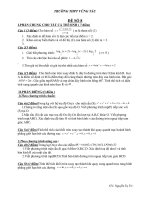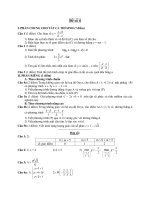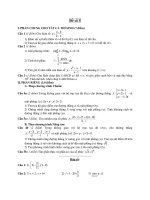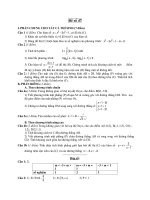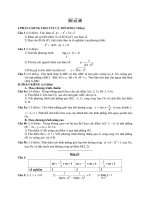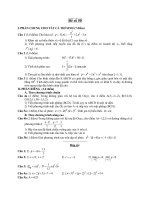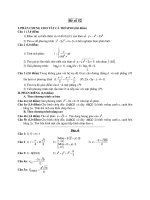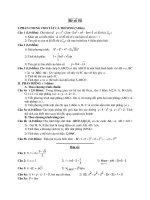- Trang chủ >>
- Văn Mẫu >>
- Văn Kể Chuyện
DE ON THI CHUYEN QUANG TRUNG 01 NH 1314
Bạn đang xem bản rút gọn của tài liệu. Xem và tải ngay bản đầy đủ của tài liệu tại đây (153.43 KB, 12 trang )
<span class='text_page_counter'>(1)</span>UBND TỈNH BÌNH PHƯỚC KỲ THI TUYỂN SINH LỚP 10 THPT CHUYÊN QUANG TRUNG SỞ GIÁO DỤC VÀ ĐÀO TẠO NĂM HỌC 2013-2014 TEST NUMBER 1. Môn thi: TIẾNG ANH (chuyên) Ngày thi: 29/06/2014 (Đề thi này gồm có 06 trang) Thời gian làm bài: 120 phút. Họ và tên thí sinh: ……………….………………….. Số báo danh: ………... Chú ý: Thí sinh làm bài vào phiếu trả lời (có phát kèm đề).. A. PHẦN TRẮC NGHIỆM. I. PHONETICS (1 pt) 1. Choose a word (A, B, C, D) that has the underlined part pronounced differently from the others.(0.5 pt) 1. A. food B. school C. tool D. book 2. A. compose B. emotion C. symphony D. concern 3. A. erased B. preserved C. attacked D. arrived 4. A. species B. pollute C. accept D. receipt 5. A. loves B. laughs C. crops D. earthquakes 2. Choose the word (A, B, C, D) whose main stress pattern is not the same as that of the others. (0.5 pt) 6. A. tomorrow B. important C. mystery D. however 7. A. celebrate B. historical C. retirement D. communicate 8. A. frequently B. gymnastic C. adjective D. difference 9. A. understand B. engineer C. Vietnamese D. adventure 10. A. laboratory B. electricity C. education D. mathematics. II. VOCABULARY AND GRAMMAR. (5 pts) Choose the word or phrase (A, B, C or D) that best completes the sentences. 11. Today’s football match has been_______ because of bad weather. They will play next Saturday instead. A. cancelled B. postponed C. put away D. decided 12. The hen has just_______ an egg. A. lain B. laid C. lied D. lay 13. The director retired early _______ ill-health. A. on behalf of B. ahead of C. on account of D. in front of 14. I’m not _______ with that particular expression. A. aware B. common C. agree D. familiar 15. What comes out of a car exhaust is called_______. A. clouds B. fumes C. scents D. petrol 16. Since he moved house, he hasn’t had much _______ with his friends. A. connection B. contact C. business D. meeting 17. She wondered _______ her father looked like now, after so many years away. A. how B. whose C. that D. what 18. If you go on ahead, I’ll _______ you later. A. catch up on B. catch up with C. fit in with D. walk out on 19. The children had been _______ of the danger, but had taken no notice. A. warned B. explained C. prevented D. shown 20. Walking down the street, she noticed a long _______ of houses, all exactly alike. A. queue B. row C. rank D. tail 21. The _______ at the football match cheered their team on. A. audience B. onlookers C. bystanders D. spectators 22. She asked me _______ to another country in the region. A. weather I had been B. if I had been C. I had been D. had I been 23. I wish you _______ here with me now. A. would be B. will be C. were D. had been.
<span class='text_page_counter'>(2)</span> 24. _______ I love you, I can’t let you do whatever you like. A. Much as B. Whatever C. Whether D. Despite 25. I _______ on the beach this time tomorrow. A. will lie B. will be lying C. am going to lie D. will have lied 26. Our parents don’t allow _______ out after midnight. A. to go B. us go C. us going D. going 27. We’ve got time for a coffee, _______? A. have we B. haven’t us C. have us D. haven’t we 28. My uncle is interested in _______ stamps. A. collected B. collecting C. collect D. to collect 29. I have heard nothing from him since _______. A. he had left B. he leaves C. he has left D. he left 30. “Let’s go camping.” – “_______” A. That’s a good idea B. No, let’s do that C. I can agree with you more D. No, thanks 31. I come from a city _______ in the southeastern part of the country. A. to locate B. located C. locating D. is located 32. She was the last person _______ the room. A. leave B. left C. leaving D. to leave 33. How many countries take part _______ the Asian Games. A. of B. at C. with D. in 34. The first person _______ the classroom last Monday might know the reason. A. entered B. to enter C. who enters D. whom enters 35. Last night, when I came back home, my parents _______ to bed. A. went B. go C. had gone D. were going 36. His hobby is_______ books and stamps. A. collect B. collecting C. collection D. collected 37. When I was a child, I _______ the violin. A. could play B. could to play C. can play D. can to play 38. Lan _______ with her family since she was in grade 10. A. lived B. lives C. have lived D. has lived 39. Who is the first man to fly _______ space? A. to B. about C. from D. into 40. _______ have you lived in Vietnam? – For two years. A. How long B. How far C. How many D. How much 41. The boy_______ by the teacher yesterday. A. punish B. punished C. punishing D. was punished 42. She _______ Hanoi last year A. went B. go C. goes D. is going 43. Newspapers should _______ printing statements that they cannot check. A. decide B. refuse C. avoid D. neglect 44. Our house, _______ was destroyed in the storm, is now being rebuilt. A. that B. whose C. which D. whom 45. After they _______ their work, they went home. A. finished B. has finished C. had finished D. will finished 46. The last person _______ the room must turn off the light. A. leaving B. left C. leave D. to leave 47. Mary is _______ than Lan A. tallest B. taller C. the taller D. more taller 48. Her computer _______ a few weeks ago. A. has been repaired B. repaired C. was being repaired D. was repaired.
<span class='text_page_counter'>(3)</span> 49. Paul hates _______ his picture taken. A. had B. having C. have D. to have 50. We took this holiday, _______? A. did we B. didn’t we C. do we D. don’t we 51. It _______ Lan who always helps him in his trouble. A. is B. has been C. Will be D. was 52. It was the red car _______ crashed into mine yesterday. A. who B. That C. what D. Which 53. The woman _______ next door is a famous singer . A. lives B. living C. Who live D that living 54. She has _______ work to do that she gets very tired. A. so many B. much more C. too much D. so much 55. He went into the bank_______ out some money. A. to be taking B. to take C. and take D. and taking 56. _______ the wet weather, the football match went ahead. A. Although B. In spite of C. Owing to D. However 57. We expected him at eight but he finally _______ at midnight. A. turned up B. turned out C. came to D. came off 58. More than two hundred police officers are _______ in the investigation. A. absorbed B. engrossed C. specialized D. involved 59. The doctor has advised him to cut down_______ his drinking. A. on B. in C. with D. to 60. It’s time we _______ away with our old-fashioned prison. A. do B. did C. have done D. shall do III. LANGUAGE FUNTIONS (0.5 pt) Choose the word or phrase (A, B, C or D) that best completes the sentences. 61. –“Bye!” –“_____________.” A. See you lately B. Thank you C. Meet you again D. See you later 62. –“I’ve passed my driving test.” –“_____________.” A. Congratulations! B. That’s a good idea. C. Do you? D. It’s nice of you to say so. 63. –“Could I have ____________ more sugar in my coffee, please?” A. little B. many C. some D. few 64. –“Would you like to have dinner with me?” –“______________.” A. Yes, I’d love to B. Yes, so do I C. I’m very happy D. Yes, it is 65. –“____________where the nearest post office is?” –“Turn left and then turn right.” A. Could you tell me B. Should you show me C. Do you tell me D. Will you say me IV. GUIDED CLOZE TEST (1 PT) Choose the word or phrase (A, B, C or D) that best fits each blank space in the following passage. I live in a small village (66)____ Henfield - there are about 500 people here. I love it because it is (67) ____ and life is slow and easy. You never (68) ____ queue in shops or banks. The village is clean - people (69) ____ it and don’t throw their rubbish in the streets. The air is also (70) ____ because there’s not much heavy traffic. It’s much more (71) ____ here than in a city . Everyone knows everyone and (72) ____ someone has problem, there are always people who can help .There aren’t (73) ____ things I don’t like about Henfield. One thing is that there’s not much (74) ____ in the evening - we haven’t got any cinemas or theaters. Another problem is that people always talk about (75) ____ and everyone knows what everyone else is doing. But I still prefer village life to life in a big city. 66. A. was B. is C. called D. name 67. A. quietly B. quiet C. noisy D. noisily 68. A. had B. should C. wait D. have to 69. A. look after B. find C. think D. look for 70. A. dirty B. not clean C. clean D. dizzy.
<span class='text_page_counter'>(4)</span> 71. A. friendly B. unfriendly C. boring D. uninteresting 72. A .if B. and C. so D. but 73. A. much B. a little C. a few D. many 74. A. doing B. to do C. jobs D. things 75. A. another B. every one C. each other D. any one II. Read the passage carefully and choose the best answer to the questions below ; During the teenage years, many young people can at times be difficult to talk to . They often seem to dislike being questioned. They may seem unwilling to talk about their work in school. This is a normal development at this age , though it can be very hard for parents to understand. It is part of becoming independent of teenagers trying to be adult while they are still growing up . Young people are usually more willing to talk if they believe that questions are asked out of real interest and not because people are trying to check up on them . Parents should do their best to talk to their sons and daughters about school work and future plant but should not push them to talk if they don't want to . Parents should also watch for the danger signs: some young people in trying to be adult may experiment with sex, drugs, alcohol, or smoking. Parents need to watch for any signs of unusual behaviour which may be connected with these and get help if necessarry. 76. This passage is taken from a A. handbook for parents B. school timetable C. teenage magazine C. book for children 77. Why do adults sometimes find teenagers difficult to talk to. A. because most teenagers are quiet B. because teenagers don't want to talk to other people. C. because teenagers think adults are not honest D. because most teenagers hate adults. 78. When can you expect young people to be more talkative than usual. A. When people talk to them because they are really interested and not just checking on them. B. When adults give them a lot money to spend. C. When adults talk to them about something other than their work in school. D. When adults talk to them about sex, alcohol and drugs. 79. Some teenagers experiment with drinking bad smoking because A. cigarettes and alcohol are available everywhere. B. cigarettes and alcohol are cheap C. women like smoking and drinking men D. they regard them as a mark of eduthood 80. The word BEHAVIOUR in the passage most nearly means A. feeling B. manners C.activities D. reaction. B. PHẦN TỰ LUẬN. I. VERB FORMS. (1.5 pts) Give the correct form of the verbs in brackets to complete the sentences. 1. You (81-not tidy) ________________ this room for weeks. 2. As soon as I graduate, I (82- return) ________________to my hometown. 3. I (83- sit) ________________down for a rest while the shoes (84- repair) ________________. 4. She dislikes (85-ask) ________________to do something by others. 5. How long ago you (86- not see) ________________him? 6. Stay here till the light (87- turn) ________________green. 7. When I first met him, he (88- work) ________________in a restaurant. 8. The last time he (89- see) ________________in public, he (90- wear) ________________a grey suit. II. WORD FORMS. (1.5 pts) 91. We must limit population ________________because our resources are limited. (GROW) 92. Children get a great deal of ________________when Tet comes. (EXCITE) 93. The English language training is a good ________________for any career. (PREPARE) 94. There is a ________________of food in flooded areas. (SHORT).
<span class='text_page_counter'>(5)</span> 95. Many people are not aware of population ________________ .(EXPLODE) 96. The United Nation ia an international ________________ .(ORGANISE) 97. The area that has the ________________ population growth rate is Latin America. (HIGH) 98. Mut , which is ________________ fruit , is very popular. (CANDY) 99. Do you know how to cook ________________ foods? (TRADITION) 100. We should carry out population ________________ programmes. (EDUCATE) III. READING COMPREHENSION. (1 pts) Read the passage carefully and choose the correct answer: True (T), False (F), No information (NI) LEARNING ENGLISH It is not easy for adult students of English to improve their accents. Unlike children, who are flexible, adults often find it hard to change the way they speak. This is why even the top, or smartest adult students have difficulty with pronunciation. There are several things that an international student can do to improve his or her pronunciation. One method is to sign up for a pronunciation class. Studying pronunciation can help students to understand the rules of English, but in order to practice speaking, students often need to be exposed to English outside the classroom as well. This is why many students say that studying in an English-speaking country greatly affects their English. Living with native speakers can help students can also learn important cultural information. This can help to prevent misunderstandings that can occur when people from different cultures live together. Living with someone from another culture can be difficult. International students are usually excited when they first show up at their new homes, but after a few months they may start to think about their home countries and get homesick. Students who are homesick get depressed quickly. They might cry a lot or want to be alone. This makes it difficult for them to make friends and learn English. T/F 101. Adult students of English cannot improve their accents because they are slow to change. 102. Attending a pronunciation class can be very helpful to adult learners who have problems with their pronunciation. 103.To avoid misunderstandings about cultures, students should live with native speakers. 104. On their arrival , most international students may forget about the problems because they are very excited . 105. The passage implies that adult learners shouldn’t study English in an English-speaking country to avoid these problems . IV. PREPOSITIONS AND PHRASAL VERBS. Supply each space with a suitable preposition to complete each sentence. 106. _______ the age of 40, he had written three best-selling novels. 107. Scientists are very concerned _______the consequences of climate change. 108. There is no point _______asking Sam for help. 109. Lan’s alarm clock didn’t go _______this morning, so she got up late. 110. Don’t make up your mind at once, talk _______with your lawyer first. 111. He grew _______a very good player. 112. Nobody helped him. He managed it _______his own. 113. Vietnam is a country _______great potential. 114. We both thank you _______the bottom of our hearts. 115. This American woman has become accustomed _______ eating Vietnamese food. V. ERROR CORRECTION (2 pts) There are ten errors in the following passage. Identify the errors, then underline and correct them. Write your answers in the numbered spaces. When I was a boy, children always objected to wear school 116. _____________ uniform but teachers were keen about it because they said all of 117. _____________ looked like. Otherwise, they said, children would compete upload.123doc.net. _____________ with each other and the poorer children would be shameful 119. _____________.
<span class='text_page_counter'>(6)</span> because people would see straight away what poor they were. In 120. _____________ reent years, however, many schools have giving up the idea of 121. _____________ making children to wear uniform but, funnily enough, said that 122. _____________ children can wear what they like, they have adopted an uniform 123. _____________ of them own. Once a journalist came to a school, he found out 124. _____________ that all the boys and girls at the school were dressed of jeans. 125. _____________ VI. SENTENCE TRANSFORMATION (2.5 pts) 126. It is said that the robber was caught while climbing up a fence. => The robber ........................................................................................................................................... 127. It may rain hard this afternoon, so take the raincoat with you. => In case .................................................................................................................................................. 128. As soon as the teacher left, the students started shouting again. => Hardly .................................................................................................................................................. 129. The children were so excited that they talked about the show all night long. => Such ..................................................................................................................................................... 130. The meeting will end before we reach the school. => By the .................................................................................................................................................. 131. It was careless of you to leave the windows open last night. => You shouldn’t ...................................................................................................................................... 132. He hasn’t been back to his hometown for over 20 years. => It is ....................................................................................................................................................... 133. Jack doesn’t know all the answers, though he pretends to. => Jack acts as .......................................................................................................................................... 134. I wish you hadn’t breathed a word about his private life to anyone. => I would like .......................................................................................................................................... 135. It was such a boring film that we left before the end. => The film wasn’t ................................................................................................................................... VII. WRITING (2 pts) How the media help you in studying? Write a composition (about 180 – 200 words) to state your ideas. ………………………………………………………………………………………………………………………………………………………………………………….. ………………………………………………………………………………………………………………………………………………………………………………….. ………………………………………………………………………………………………………………………………………………………………………………….. ………………………………………………………………………………………………………………………………………………………………………………….. ………………………………………………………………………………………………………………………………………………………………………………….. ………………………………………………………………………………………………………………………………………………………………………………….. ………………………………………………………………………………………………………………………………………………………………………………….. ………………………………………………………………………………………………………………………………………………………………………………….. ………………………………………………………………………………………………………………………………………………………………………………….. ………………………………………………………………………………………………………………………………………………………………………………….. ………………………………………………………………………………………………………………………………………………………………………………….. ………………………………………………………………………………………………………………………………………………………………………………….. ………………………………………………………………………………………………………………………………………………………………………………….. ………………………………………………………………………………………………………………………………………………………………………………….. ………………………………………………………………………………………………………………………………………………………………………………….. ………………………………………………………………………………………………………………………………………………………………………………….. …………………………………………………………………………………………………………………………………………………………………………………... --------------The End-------------UBND TỈNH BÌNH PHƯỚC KỲ THI TUYỂN SINH LỚP 10 THPT CHUYÊN QUANG TRUNG SỞ GIÁO DỤC VÀ ĐÀO TẠO NĂM HỌC 2013-2014 TEST NUMBER 1.
<span class='text_page_counter'>(7)</span> Môn thi: TIẾNG ANH (chuyên) Ngày thi: 29/06/2013. (Đề thi này gồm có 06 trang) Thời gian làm bài: 120 phút. Họ và tên thí sinh: ……………….………………….. Số báo danh: ………... Chú ý: Thí sinh làm bài vào phiếu trả lời (có phát kèm đề).. A. PHẦN TRẮC NGHIỆM. I. PHONETICS (1 pt) 1. Choose a word (A, B, C, D) that has the underlined part pronounced differently from the others.(0.5 pt) 1. A. food B. school C. tool D. book 2. A. compose B. emotion C. symphony D. concern 3. A. erased B. preserved C. attacked D. arrived 4. A. species B. pollute C. accept D. receipt 5. A. loves B. laughs C. crops D. earthquakes 2. Choose the word (A, B, C, D) whose main stress pattern is not the same as that of the others. (0.5 pt) 6. A. tomorrow B. important C. mystery D. however 7. A. celebrate B. historical C. retirement D. communicate 8. A. frequently B. gymnastic C. adjective D. difference 9. A. understand B. engineer C. Vietnamese D. adventure 10. A. laboratory B. electricity C. education D. mathematics. II. VOCABULARY AND GRAMMAR. (5 pts) Choose the word or phrase (A, B, C or D) that best completes the sentences. 11. Today’s football match has been_______ because of bad weather. They will play next Saturday instead. A. cancelled B. postponed C. put away D. decided 12. The hen has just_______ an egg. A. lain B. laid C. lied D. lay 13. The director retired early _______ ill-health. A. on behalf of B. ahead of C. on account of D. in front of 14. I’m not _______ with that particular expression. A. aware B. common C. agree D. familiar 15. What comes out of a car exhaust is called_______. A. clouds B. fumes C. scents D. petrol 16. Since he moved house, he hasn’t had much _______ with his friends. A. connection B. contact C. business D. meeting 17. She wondered _______ her father looked like now, after so many years away. A. how B. whose C. that D. what 18. If you go on ahead, I’ll _______ you later. A. catch up on B. catch up with C. fit in with D. walk out on 19. The children had been _______ of the danger, but they had taken no notice. A. warned B. explained C. prevented D. shown 20. Walking down the street, she noticed a long _______ of houses, all exactly alike. A. queue B. row C. rank D. tail 21. The _______ at the football match cheered their team on. A. audience B. onlookers C. bystanders D. spectators 22. She asked me _______ to another country in the region. A. weather I had been B. if I had been C. I had been D. had I been 23. I wish you _______ here with me now. A. would be B. will be C. were D. had been 24. _______ I love you, I can’t let you do whatever you like. A. Much as B. Whatever C. Whether D. Despite 25. I _______ on the beach this time tomorrow..
<span class='text_page_counter'>(8)</span> A. will lie B. will be lying C. am going to lie D. will have lied 26. Our parents don’t allow _______ out after midnight. A. to go B. us go C. us going D. going 27. We’ve got time for a coffee, _______? A. have we B. haven’t us C. have us D. haven’t we 28. My uncle is interested in _______ stamps. A. collected B. collecting C. collect D. to collect 29. I have heard nothing from him since _______. A. he had left B. he leaves C. he has left D. he left 30. “Let’s go camping.” – “_______” A. That’s a good idea B. No, let’s do that C. I can agree with you more D. No, thanks 31. I come from a city _______ in the southeastern part of the country. A. to locate B. located C. locating D. is located 32. She was the last person _______ the room. A. leave B. left C. leaving D. to leave 33. How many countries take part _______ the Asian Games. A. of B. at C. with D. in 34. The first person _______ the classroom last Monday might know the reason. A. entered B. to enter C. who enters D. whom enters 35. Last night, when I came back home, my parents _______ to bed. A. went B. go C. had gone D. were going 36. His hobby is_______ books and stamps. A. collect B. collecting C. collection D. collected 37. When I was a child, I _______ the violin. A. could play B. could to play C. can play D. can to play 38. Lan _______ with her family since she was in grade 10. A. lived B. lives C. have lived D. has lived 39. Who is the first man to fly _______ space? A. to B. about C. from D. into 40. _______ have you lived in Vietnam? – For two years. A. How long B. How far C. How many D. How much 41. The boy_______ by the teacher yesterday. A. punish B. punished C. punishing D. was punished 42. She _______ Hanoi last year A. went B. go C. goes D. is going 43. Newspapers should _______ printing statements that they cannot check. A. decide B. refuse C. avoid D. neglect 44. Our house, _______ was destroyed in the storm, is now being rebuilt. A. that B. whose C. which D. whom 45. After they _______ their work, they went home. A. finished B. has finished C. had finished D. will finished 46. The last person _______ the room must turn off the lights. A. leaving B. left C. leave D. to leave 47. Mary is _______ than Lan A. tallest B. taller C. the taller D. more taller 48. Her computer _______ a few weeks ago. A. has been repaired B. repaired C. was being repaired D. was repaired 49. Paul hates _______ his picture taken. A. had B. having C. have D. to have 50. We took this holiday, _______?.
<span class='text_page_counter'>(9)</span> A. did we B. didn’t we C. do we D. don’t we 51. It _______ Lan who always helps him in his trouble. A. is B. has been C. Will be D. was 52. It was the red car _______ crashed into mine yesterday. A. who B. That C. what D. Which 53. The woman _______ next door is a famous singer. A. lives B. living C. who live D that living 54. She has _______ work to do that she gets very tired. A. so many B. much more C. too much D. so much 55. He went into the bank_______ out some money. A. to be taking B. to take C. and take D. and taking 56. _______ the wet weather, the football match went ahead. A. Although B. In spite of C. Owing to D. However 57. We expected him at eight but he finally _______ at midnight. A. turned up B. turned out C. came to D. came off 58. More than two hundred police officers are _______ in the investigation. A. absorbed B. engrossed C. specialized D. involved 59. The doctor has advised him to cut down_______ his drinking. A. on B. in C. with D. to 60. It’s time we _______ away with our old-fashioned prison. A. do B. did C. have done D. shall do III. LANGUAGE FUNTIONS (0.5 pt) Choose the word or phrase (A, B, C or D) that best completes the sentences. 61. –“Bye!” –“_____________.” A. See you lately B. Thank you C. Meet you again D. See you later 62. –“I’ve passed my driving test.” –“_____________.” A. Congratulations! B. That’s a good idea. C. Do you? D. It’s nice of you to say so. 63. –“Could I have ____________ more sugar in my coffee, please?” A. little B. many C. some D. few 64. –“Would you like to have dinner with me?” –“______________.” A. Yes, I’d love to B. Yes, so do I C. I’m very happy D. Yes, it is 65. –“____________where the nearest post office is?” –“Turn left and then turn right.” A. Could you tell me B. Should you show me C. Do you tell me D. Will you say me IV. GUIDED CLOZE TEST (1 PT) Choose the word or phrase (A, B, C or D) that best fits each blank space in the following passage. I live in a small village (66) _______ Hen field - there are about 500 people here. I love it because it is (67) _______ and life is slow and easy. You never (68) _______ queue in shops or banks. The village is clean people (69) _______ it and don’t throw their rubbish in the streets. The air is also (70) _______ because there’s not much heavy traffic. It’s much more (71) _______here than in a city. Everyone knows everyone and (72) _______ someone has problem; there are always people who can help. There aren’t (73) _______things I don’t like about Hen field. One thing is that there’s not much (74) _______ in the evening - we haven’t got any cinemas or theaters. Another problem is that people always talk about (75) _______ and everyone knows what everyone else is doing. But I still prefer village life to life in a big city. 66. A. was B. is C. called D. name 67. A. quietly B. quiet C. noisy D. noisily 68. A. had B. should C. wait D. have to 69. A. look after B. find C. think D. look for 70. A. dirty B. not clean C. clean D. dizzy 71. A. friendly B. unfriendly C. boring D. uninteresting 72. A . if B. and C. so D. but 73. A. much B. a little C. a few D. many.
<span class='text_page_counter'>(10)</span> 74. A. doing B. to do C. jobs D. things 75. A. another B. every one C. each other D. any one 1. Read the passage carefully and choose the best answer to the questions below; During the teenage years, many young people can at times be difficult to talk to. They often seem to dislike being questioned. They may seem unwilling to talk about their work in school. This is a normal development at this age, though it can be very hard for parents to understand. It is part of becoming independent of teenagers trying to be adult while they are still growing up. Young people are usually more willing to talk if they believe that questions are asked out of real interest and not because people are trying to check up on them. Parents should do their best to talk to their sons and daughters about school work and future plant but should not push them to talk if they don't want to. Parents should also watch for the danger signs: some young people in trying to be adult may experiment with sex, drugs, alcohol, or smoking. Parents need to watch for any signs of unusual behaviour which may be connected with these and get help if necessarry. 76. This passage is taken from a A. handbook for parents B. school timetable C. teenage magazine C. book for children 77. Why do adults sometimes find teenagers difficult to talk to. A. because most teenagers are quiet B. because teenagers don't want to talk to other people. C. because teenagers think adults are not honest D. because most teenagers hate adults. 78. When can you expect young people to be more talkative than usual. A. When people talk to them because they are really interested and not just checking on them. B. When adults give them a lot money to spend. C. When adults talk to them about something other than their work in school. D. When adults talk to them about sex, alcohol and drugs. 79. Some teenagers experiment with drinking bad smoking because A. cigarettes and alcohol are available everywhere. B. cigarettes and alcohol are cheap C. women like smoking and drinking men D. they regard them as a mark of eduthood 80. The word BEHAVIOUR in the passage most nearly means A. feeling B. manners C. activities D. reaction. B. PHẦN TỰ LUẬN. I. VERB FORMS. (1.5 pts) Give the correct form of the verbs in brackets to complete the sentences. 1. You (81-not tidy) _____haven’t tidied__ this room for weeks. 2. As soon as I graduate, I (82- return) _____will return_____ to my hometown. 3. I (83- sit) ______sat____ down for a rest while the shoes (84- repair) ___were being repaired______. 4. She dislikes (85-ask) ______being asked____ to do something by others. 5. How long ago you (86- not see) ___didn’t you see______ him? 6. Stay here till the light (87- turn) _____turn___ green. 7. When I first met him, he (88- work) ____was working ______in a restaurant. 8. The last time he (89- see) _____was seen_____ in public, he (90- wear) ____was wearing____ a grey suit. II. WORD FORMS. (1.5 pts) 91. We must limit population ____ growth ___because our resources are limited. (GROW) 92. Children get a great deal of ____ excitement __when Tet comes. (EXCITE) 93. The English language training is a good ___ preparation _for any career. (PREPARE) 94. There is a ___ shortage __of food in flooded areas. (SHORT) 95. Many people are not aware of population __ explosion ___. (EXPLODE) 96. The United Nation ia an international ______ organization _____. (ORGANISE) 97. The area that has the __ highest __population growth rate is Latin America. (HIGH) 98. Mut, which is ___ candied __fruit , is very popular. (CANDY).
<span class='text_page_counter'>(11)</span> 99. Do you know how to cook ___ traditional __foods? (TRADITION) 100. We should carry out population ___ educational ___programs. (EDUCATE) III. READING COMPREHENSION. (1 pts) Read the passage carefully and choose the correct answer: True (T), False (F), No information (NI) LEARNING ENGLISH It is not easy for adult students of English to improve their accents. Unlike children, who are flexible, adults often find it hard to change the way they speak. This is why even the top, or smartest adult students have difficulty with pronunciation. There are several things that an international student can do to improve his or her pronunciation. One method is to sign up for a pronunciation class. Studying pronunciation can help students to understand the rules of English, but in order to practice speaking, students often need to be exposed to English outside the classroom as well. This is why many students say that studying in an English-speaking country greatly affects their English. Living with native speakers can help students can also learn important cultural information. This can help to prevent misunderstandings that can occur when people from different cultures live together. Living with someone from another culture can be difficult. International students are usually excited when they first show up at their new homes, but after a few months they may start to think about their home countries and get homesick. Students who are homesick get depressed quickly. They might cry a lot or want to be alone. This makes it difficult for them to make friends and learn English. T/F 101. Adult students of English cannot improve their accents because they are slow to change. F 102. Attending a pronunciation class can be very helpful to adult learners who have problems with T their pronunciation. 103. To avoid misunderstandings about cultures, students should live with native speakers. T 104. On their arrival, most international students may forget about the problems because they are F very excited. 105. The passage implies that adult learners shouldn’t study English in an English-speaking country F to avoid these problems. IV. PREPOSITIONS AND PHRASAL VERBS. Supply each space with a suitable preposition to complete each sentence. 106. ___ By __ the age of 40, he had written three best-selling novels. 107. Scientists are very concerned __ About ___ the consequences of climate change. 108. There is no point ___ In _ asking Sam for help. 109. Lan’s alarm clock didn’t go __ Off __ this morning, so she got up late. 110. Don’t make up your mind at once, talk __ Over __ with your lawyer first. 111. He grew ___ Into ___ a very good player. 112. Nobody helped him. He managed it __ On __ his own. 113. Vietnam is a country _ With ___ great potential. 114. We both thank you __ From __ the bottom of our hearts. 115. This American woman has become accustomed ___ To __ eating Vietnamese food. V. ERROR CORRECTION (2 pts) There are ten errors in the following passage. Identify the errors, then underline and correct them. Write your answers in the numbered spaces. When I was a boy, children always objected to wear school 116. ___wearing___ uniform but teachers were keen about it because they said all of 117. ______on_____ the children looked like. Otherwise, they said, children would compete upload.123doc.net. ___alike______ with each other and the poorer children would be shameful 119. ___ashamed___ because people would see straight away what poor they were. In 120. _____how_____ recent years, however, many schools have giving up the idea of 121. ____given_____ making children to wear uniform but, funnily enough, said that 122. ___wear______ children can wear what they like, they have adopted an uniform 123. _____a_______.
<span class='text_page_counter'>(12)</span> of them own. Once a journalist came to a school, he found out 124. ___their______ that all the boys and girls at the school were dressed of jeans. 125. _____in______ VI. SENTENCE TRANSFORMATION (2.5 pts) 126. It is said that the robber was caught while climbing up a fence. => The robber is said to have been caught while climbing up a fence. 127. It may rain hard this afternoon, so take the raincoat with you. => In case it rains hard this afternoon, take/ you should take the raincoat with you. 128. As soon as the teacher left, the students started shouting again. => Hardly had/did the teacher left/leave when the students started shouting again. 129. The children were so excited that they talked about the show all night long. => Such was their/the children’s excitement that the children/they talked about the show all night long. 130. The meeting will end before we reach the school. => By the time we reach the school, the meeting will have ended. 131. It was careless of you to leave the windows open last night. => You shouldn’t have left the windows open last night. 132. He hasn’t been back to his hometown for over 20 years. => It is over 20 years since he last went back to his hometown. 133. Jack doesn’t know all the answers, though he pretends to. => Jack acts as if/though he knew all the answers. 134. I wish you hadn’t breathed a word about his private life to anyone. => I would like you not to have breathed a word about his private life to anyone. 135. It was such a boring film that we left before the end. => The film wasn’t so interesting that we left before the end. VII. WRITING (2 pts) How the media help you in studying? Write a composition (about 180 – 200 words) to state your ideas. ………………………………………………………………………………………………………………………………………………………………………………….. ………………………………………………………………………………………………………………………………………………………………………………….. ………………………………………………………………………………………………………………………………………………………………………………….. ………………………………………………………………………………………………………………………………………………………………………………….. ………………………………………………………………………………………………………………………………………………………………………………….. ………………………………………………………………………………………………………………………………………………………………………………….. ………………………………………………………………………………………………………………………………………………………………………………….. ………………………………………………………………………………………………………………………………………………………………………………….. ………………………………………………………………………………………………………………………………………………………………………………….. ………………………………………………………………………………………………………………………………………………………………………………….. ………………………………………………………………………………………………………………………………………………………………………………….. ………………………………………………………………………………………………………………………………………………………………………………….. ………………………………………………………………………………………………………………………………………………………………………………….. ………………………………………………………………………………………………………………………………………………………………………………….. ………………………………………………………………………………………………………………………………………………………………………………….. ………………………………………………………………………………………………………………………………………………………………………………….. …………………………………………………………………………………………………………………………………………………………………………………... --------------The End--------------.
<span class='text_page_counter'>(13)</span>
